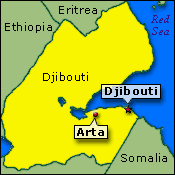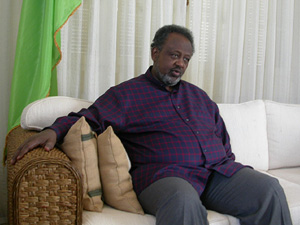
webmaster
© Copyright DEHAI-Eritrea OnLine, 1993-2011
All rights reserved
From: Berhane Habtemariam (Berhane.Habtemariam@gmx.de)
Date: Wed Feb 02 2011 - 08:37:09 EST
DJIBOUTI: Interview with President Guelleh
Eritrea
Q: What is Djibouti's border situation with Eritrea?
A: We have Qatar mediating between us. Our lawyers have presented all of our
documents stating our case. We are hopeful the situation will be resolved
very soon.
ARTA, 2 February 2011 (IRIN) - IRIN interviewed Djiboutiís President Ismail
Omar Guelleh on 27 January in Arta about the drought, humanitarian
challenges and regional issues.
Q: Is the current drought in Djibouti more serious than previous ones?
A: We are going through what meteorologists call the La NiŮa phenomenon. The
problem in our region is that we donít plan properly for what we know is
coming. Four months ago, we had a lot of rain. Four months later, we are
dying of starvation and lack of water.
In Djibouti, we are continuously monitoring the drought situation. There are
some parts, particularly the eastern part of the country, that are more
seriously affected than other parts. We have sent teams there to make sure
that people [in need] are reached before it is too late. Government
ministries are working with [the UN] WFP [World Food Programme] to mitigate
the situation. There is no catastrophe; we are managing the situation.
Q: These droughts recur yet the Horn of Africa does not seem to learn from
the past. In your opinion, can droughts be tackled in a sustainable
long-term manner?
A: A lot of things can be done. First, it is a matter of planning and
harvesting rain water. We also need to control livestock grazing so it does
not deplete the grazing areas. Some areas should be off-limits during good
rains, so they become available during dry times.
We also have drought resistant plants that grow in this country and the
region. In Djibouti, one of the things we want to do is to make those plants
become animal feed so we can make it available in drought times when pasture
is low or non-existent.
We have carried out studies on water-harvesting; we intend to create
reservoirs that can hold 10-20 million cubic metres of water. Once we do
this, the water will become available during the dry seasons.
Q: What would you say are the other main humanitarian challenges facing
Djibouti?
A: First and foremost, we must defeat this drought and famine problem; and
we can do it. This is our main challenge.
Q: The country is currently experiencing an economic boom, particularly in
construction. How well is the economy doing and how has this benefited the
population?
A: Our growth is good, at 5.5 percent and our deficit is low. We are also
attracting a lot of direct foreign investment. The economy is creating jobs
but, unfortunately, we lack the skilled workforce that can take advantage of
it.
A lot of jobs opening up require specialized skills and our youth do not
have these yetÖ We do have unemployment, but we are addressing that to make
sure that our people have the skills they need to get jobs.
Malnutrition
Q: Three years ago, Djibouti's Global Acute Malnutrition (GAM) was 17
percent - higher than the World Health Organization threshold of 15 percent.
Has this situation changed?
A: We initiated a lot of health centres with our partners throughout the
country to monitor malnourished children and provide the necessary food to
those identified. Mothers come to centres to feed the children and take them
back home in the evening. We are seriously tackling this problem and we
intend not only to reduce it but eliminate it before 2015.
The government also will achieve its MDGs [Millennium Development Goals] in
education, particularly girlsí education.
Eritrea
Q: What is Djibouti's border situation with Eritrea?
A: We have Qatar mediating between us. Our lawyers have presented all of our
documents stating our case. We are hopeful the situation will be resolved
very soon.
Somalia
Q: Somalia has been a key challenge for the region and for Djibouti in
particular. Do you sometimes despair about the situation?
A: I do sometimes despair. We have invested a lot of time and resources to
try and get [Somalia] out of the situation it is in. At the moment, I cannot
honestly point to anything that I can say `If this is done, Somalia will
regain its honor, dignity in the world.í I just donít know what the cure is.
We tried everything. The only thing left is perhaps a Tunisia-like uprising
by the people. Maybe Somalia needs to tell these people: `We are fed up. Go
away, we donít want you.'
We are in a situation where, when someone becomes president, some group will
say he is not to our liking and they [usually] have veto power. The only
reason they donít [like] that individual is because they donít [see] their
own personal interest in there. It has nothing to do with the interest of
the people or what the people want.
http://www.irinnews.org/images/1354.GIF
Photo: <http://www.irinnews.org/> IRIN
<http://www.irinnews.org/PhotoDetail.aspx?ImageId=1354>
http://www.irinnews.org/images/design/magnify.gif
Map of Djibouti
Q: There has been talk of Djibouti sending troops to Somalia; are you
sending peacekeepers, and what difference would that make?
A: We are not sending combat troops but trainers. We want to train our
Somali brothers and instill in them that they are the owners of their
country; they are the ones who must die for it. They must be able to
challenge every other armed force. Our aim is to build the capacity and
foundation of the Somali army.
Q: In your opinion, what more can the UN/international community do to help
Somalia?
A: We are at a stage where people have scissors to cut up the country. The
other day I heard about a southeast state. The US mentioned that it talks to
existing entities; now everyone is getting in on the act.
Intervention from outside has not helped and will never help. The solution
is for the people to say stop. I would like to see the people of Somalia say
they have had enough of displacement; they have had enough of being refugees
and that they have had enough of guns.
<http://www.irinnews.org/PhotoDetail.aspx?ImageId=2003102914>
http://irinnews.org/images/2003102914.jpg
Photo: <http://www.irinnews.org/> irin
President Ismail Omar Guelleh of Djibouti



----[This List to be used for Eritrea Related News Only]----
